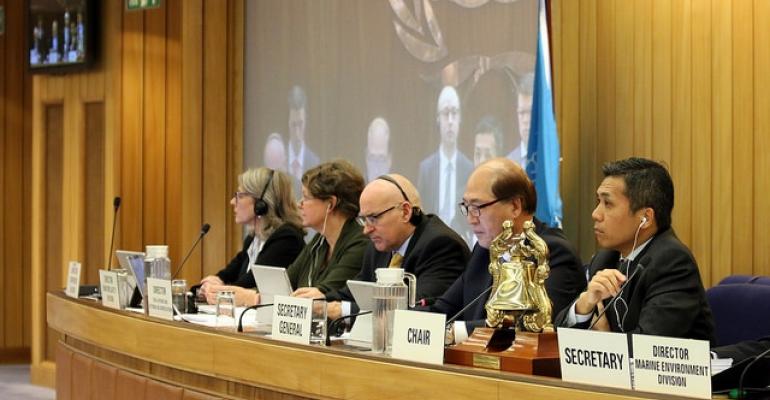Dumping plastics is already prohibited
Dumping plastics into the sea is already prohibited under regulations for the prevention of pollution by garbage from ships in the International Convention for the Prevention of Pollution from Ships (MARPOL), which also oblige governments to ensure adequate port reception facilities to receive ship waste.
Under the London Convention and Protocol on the dumping of wastes at sea, only permitted materials can be dumped and this waste—such as from dredging—has to be fully assessed to ensure it does not contain harmful materials like plastics.
More needs to be done
Recognizing that more needs to be done to address the environmental and health problems posed by marine plastic litter, IMO member states meeting in the recent Marine Environment Protection Committee (MEPC 73) agreed actions to be completed by 2025, which relate to all ships, including fishing vessels. The action plan supports IMO’s commitment to meeting the targets set in the UN 2030 Sustainable Development Goal 14 on the oceans.
Dangers to shipping, sea life and human health
Marine plastic litter can also pose dangers to shipping. For example, abandoned or lost fishing nets can become entangled in propellers and rudders.
The action plan notes that marine plastic litter enters the marine environment as a result of a wide range of land- and sea-based activities. Both macroplastics (for example, large plastic items such as plastic bags, water bottles and fishing gear) and microplastics (small plastic particles generally five millimetres or smaller) persist in the marine environment and result in harmful effects on marine life and biodiversity, as well as negative impacts on human health.
In addition, marine plastic litter negatively impacts on activities such as tourism, fisheries and shipping. This plastic material has the potential to be brought back into the economy by reuse or recycling. Studies demonstrate that despite the existing regulatory framework to prevent marine plastic litter from ships, discharges into the sea continue to occur.
The action plan provides IMO with a mechanism to identify specific outcomes, and actions to achieve these outcomes, in a way that is meaningful and measureable. The plan builds on existing policy and regulatory frameworks, and identifies opportunities to enhance these frameworks and introduce new supporting measures to address the issue of marine plastic litter from ships. The concrete measures and details will be further considered by MEPC 74.
Reporting and retrieving lost fishing gear
Specific identified measures include a proposed study on marine plastic litter from ships and looking into the availability and adequacy of port reception facilities. The plan also recommends considering making the marking of fishing gear mandatory, in cooperation with the Food and Agriculture Organization, promoting reporting the loss of fishing gear, facilitating the delivery of retrieved fishing gear to shore facilities and reviewing provisions related to the training of fishing vessel personnel and familiarization of seafarers to ensure awareness of the impact of marine plastic litter.
Further, the plan promotes considering the establishment of a compulsory mechanism to declare loss of containers at sea and identify number of losses. Other steps include enhancing public awareness and strengthening international cooperation, in particular within the Food and Agriculture Organization and UN environment.
Continued work with UN partners
IMO will continue to work with UN partners, including the Food and Agriculture Organization, through the joint FAO/IMO ad hoc working group on illegal, unregulated and unreported fishing and related matters; the Joint Group of Experts on the Scientific Aspects of Marine Environmental Protection, the UN environment-managed Global Partnership on Marine Litter, the UN Open-ended Informal Consultative Process on Oceans and the Law of the Sea and the UN Environment Assembly.
The action plan will be reviewed regularly and updated as needed.
Copyright © 2024. All rights reserved. Seatrade, a trading name of Informa Markets (UK) Limited. Add Seatrade Cruise News to your Google News feed.


